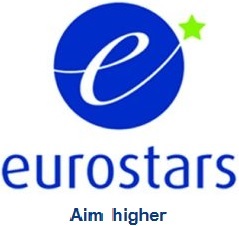 newsitems
newsitems
newsitems
EU Commisioner Füle to EuroFora on Ukraine : Accession prospects not excluded
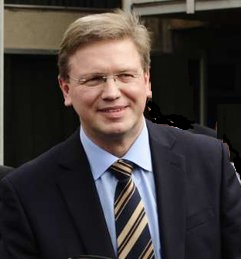
New EU Commissioner in charge of Enlargement and Neighborhood policy, Stefan Füle, speaking to "EuroFora" after an EU Parliament's Foreign affairs Committee's meeting held exceptionally behind Closed Doors and restricted to only a few Top MEPs, did not exclude an "Accession Perspective" for Ukraine.
- '"It's up to the Ukrainians themselves, and up to the (EU) Member States", Füle carefully replied to "EuroFora"" question, whether he felt that there might be an EU Accession Perspective for Ukraine in the foreseeable Future, without exluding anything a priori..
- But, "for the time being, I am dealing with Ukraine in the framework of the other part of my portofolio, which is EU's Neighborhood policy", the EU Commissioner added.
Exceptionally, an unforseen addendum on Ukraine appeared at the last minute in the Agenda of EU Parliament's Foreign Affairs Committee for Monday evening in Strasbourg, which had initially been scheduled exclusively for Iceland's EU Accession bid.
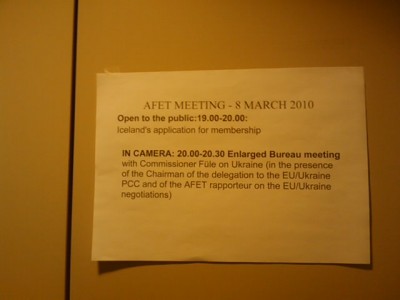
But, while the 1st part about Iceland was left Open to all MEPs and to the Press, on the contrary, the 2nd part of the Committee's meeting, officially dedicated to Ukraine, was curiously restricted only to FAC's Bureau, and was Closed to the Press...
However, Füle said to "EuroFora" that there was "nothing to be concerned about", during the exchanges he held with FAC's Top MEPs behind closed doors on Ukraine, and that, in fact, "we didn't speak only about Ukarine, but also for the Western Balkans, the Mediterranean, and other issues".
He didn't say, but didn't either exclude, whether that restricted part concerned also Turkey's controversial EU bid, or not.
A written FAC's document, nevertheless, focused only on "Ukraine", for the 2nd part of the meeting, making a careful Distinction witth its 1st part which had been clearly decicated to "Iceland's Application for (EU) Membership", as it said, keeping a carefuly neutral stance vis a vis the question whether Ukraine had, or not, any EU Accession prospects, as Füle himseld did when he spoke to "EuroFora".
However, on Turkey's controversial EU bid, Füle had not been recently as careful as for Ukraine, and had twice spoken about "Accession" Negotiations between EU and Ankara,, (both at a Hearing in Brussels last January, and during a Plenary Debate in Strasbourg on February 2010), despite EU Council's decisions, during recent years, that, in fact, the EU - Turkey Negotiations were "Open-Ended", and might eventually end up with a "Privileged Partnership", while June 2009 EU Elections were mainly won by Parties opposed to Turkey's controversial EU bid, and a growing EU Parliament's Majority repeatedly rejected any amendment claiming that EU - Turkey negotiations might be destinated to Ankara's EU Accession, (See "EuroFora"'s relevant Press Reports from November 2009 and February 2010).
It's obviously difficult, if not impossible to explain to EU Citizens why an unquestionably European Country as Ukraine, from the Geographic, Historic and Cultural point of view, which has a much better level on Education and Technology (f.ex. Antonov Airplanes, etc), Human Rights and Democracy, including Peaceful respect of International Law, than Turkey's 95% Asiatic areas with its Invasion and Occupation troops or "Casus Belli" threats, and would obviously be much Easier to integrate inside the EU, might never be a Candidate to EU Accession, while Ankara already claims to be..
But this apparently wasn't the moment for a rectification on Füle's controversial stance on Turkey's EU bid, since he "had a Diner in 10 minutes", as he said to "EuroFora", without speifying if this was with the new President of CoE's Parliamentary Assembly, Mevlut Cavesoglou from Turkey, who decided to visit EU Parliament's President, Jerzy Buzek, and all Chairmen of Political Groups of MEPs, only 2 Months after he unexpectedly got the 2 Years' Top Job last January 2010 thanks to a political deal on various Groups' sharing the chairmanship by rotation.
Controversial ECHR decision sends Cyprus' Refugees back to start anew after 20 Years Legal fight ?
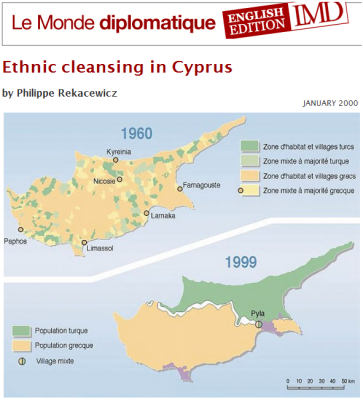
For the 1st time after more than 20 Years of Legal struggle at the European Court of Human Rights, a controversial grand Chamber's decision almost send Greek Cypriot Refugees back to a starting point, by asking them to submit their applications to a shady 2-stage mecanism set up in the Occupied Territories held by Ankara's Army since their Expulsion by the 1974 Foreign Military Occupation, before they might eventually come back to Strasbourg...
It's true that the 2010 decision by ECHR's grand Chamber (17 judges out of 47) was based on some changes mainly made between 2003-2006 , when Turkey was obliged to open the Dividing Line between the Free areas and the Occupied Territories and to establish there a Committee to deal with the Properties illegally usurpated from Greek Cypriot Refugees and Displaced Persons.
Also, ECHR explicitly rejected any "indirect legitimation of a Regime Unlawfull under International Law" in the Turkish Occupied Territories of Cyprus, and clearly confirmed that "the government of the Republic of Cyprus remains the sole Legitimate Government" in the island. ECHR also spoke about People "living under Occupation", (etc), stressing the "Fact that there is an Illegal Occupation" by Ankara's Foreign Army, and reiterated that "the overall Control exerciced by Turkey over the territory of northern Cyprus entails her (i.e. Ankara's) Responsibility for the policies and actions of the "TRNC", and .. Turkey is accountable for Violations of .. (Human) Rights which take place within that territory".
---------------
But one of the main "burning" points for the Victims, (in addition to the "Humiliation", as they said, to be obliged to step under a Foreign Occupation Army, after Years of Legal struggle in Strasbourg), is that this mecanism in the Turkish Occupied Territories seems to excessively restrict or practicaly exclude "Restitution" of Refugees' Family Homes, except only in a few, rare and/or delayed cases, and even to limit Financial Compensation, in case of definite deprivation of private property, in smaller amounts than normally due, which appear to be much less than its real Value.
Briefly speaking, Turkey could definitively exclude almost all of them, and legalise the usurpation of their Family Homes and private Properties, as well as the hindrance to return to their Family Homes and Ancestral Land where they were born and lived before being forciblly expulsed by a Foreign Military Invasion, only by paying, after 35 Years' Delay, a small portion of their value, Victims' criticized.
This Risk appears even greater, when the controversial ECH grd. Chamber's "Decision" seems to add that, in the view of a Majority of its members, there is "Defect" only when there is total "LACK OF ANY provision for Restitution", while, "it is satisfied", on the contrary, when it finds "that (some) Restitution of property has occured", without even examining how many, nor whether this is exceptional or frequent enough..
Indeed, ECHR itself observes that, already, out of "433 cases" submitted to the controversial "Committee" in the Occupied Territories since 2006, after several Years, in 2010, only .. Four (4 !) cases of some "Restitution" were noted, i.e. .. less than one percent (1%)...
Or, both ECHR in various earlier judgements, and recently UNO in its New Official Doctrine, as well as International Human Rights NGOs (like "Redress", etc), strongly stress "Restitution" and, only if it's impossible : "Full Compensation", as the main Legal Principle, which allows also Refugees and Displaced Persons' inalienable Right to Return. (See infra).
In Socio-Political terms, this obviously could mean in practice that only a few Greek Cypriot Refugees might see their Human Rights to Return back to their Family Homes and Ancestral Land respected, provoking fears of a kind of "legitimation" of Turkey's aim to keep a tight Separation between Greekl Cypriots and Turkish Cypriots in 2 different parts of the island, as Ankara illegaly imposed since its 1974 Military Invasion and Occupation, which still persists 36 Years after a provisional pretext given by a failed, short Greek Cypriot "Coup" inspired by the former Military Chunta in Athens, whose instigators were severely punished by long terms of Jail after the reestablishment of Democracy in Greece and Cyprus.
According to the recently established International Penal Court, Ethnic Cleansing in Occupied Territories, i.e. the massive import of its own Nationals by an Occupying power, in remplacement of the Native Population, obliged to flee a Foreign Military Occupation, tantamounts to a "War Crime". But Turkey is one of the rare CoE Member Countries which has not yet signed IPC's Statute, despite repeated calls by CoE Parliamentary Assembly's Resolutions for all its members to do so.
----------------------
Turkish Press and Turkish Cypriot Media in the Occupied Territories of Cyprus (where many Settlers from mainland Turkey were massively imported since the 1974 expulsion of the Greek Cypriot Majority by Ankara's Army, as CoE's Assembly repeatedly denounced in the 1990ies and 2000ies), reportedly cried "Victory" over ECHR grd. Chamber's decision, claiming that "ECHR slamed the door of Strasbourg at Greek Cypriots' faces", while, on the contrary, Greek Cypriot Press denounced an "unjust" "Shock", an "error", and/or a "Nightmare"..
Political analysts atributed ECHR grd. Chamber's "precipitation", as they said, to reject the Greek Cypriot Refugees' applications, as a way to support the current Leader of the Turkish Cyupriot Community, Mehmet Talat (considered as comparatively more "moderate"), against his main competitor, Eroglou, at the forthcoming so-called "Elections" in the Occupied Territories, exactly when the Political Campain was starting...
Given also that this controversial ECHR move, celebrated by Turkey, comes shortly before Ankara takes over CoE's Committee of Ministers' rotating Chair on November 2010 (until April 2011 included), after assuming also the Chair of CoE's ..Human Rights' meetings in just 2 Months : May 2010, while a Turkish MEP, Mevlut Cavusoglou, already got the job of CoE Parliamentary Assembly's President, for the 1st time in CoE's 60 Years' History, since January 2010 (for 2 Years), obviously, all these unprecedented events which converge towards a never seen before over-concentration of Institutional Power without any Safeguard, inevitably risks to provoke legitimate Concern and Fears by various People about eventual Risks against Human Rights and even Human Rights Defenders' Freedom around CoE in the forthcoming Months...
--------------------------------------------
The controversial ruling is not a "Judgement", but a procedural "Decicion" on the Admissibility of certain (8) applications.
Therefore, even if usualy ECHR follows its own practice, and might use now this decision as a "Pilot" case to massively reject many other Pending applications, Legally nothing deprives ECHR's freedom to decide, partially or totally, otherwise, in a differend way, at a future judgement.
It was taken by a formation of 17 Members out of the 47 ECHR's EuroJudges, and, even then, not unanimously but only "by a Majority".
Exceptionally, however, No Publication of the "Dissending Opinions" was made now, contrary to a long practice in almost all other important ECHR's rulings on Cyprus' issue.
Moreover, the Number of EuroJudges who disagreed was not published officialy, and ECHR's Press Service, contacted by "EuroFora", was unable yet to give that Number.
-----------------------
Refugees/Displaced Persons, Lawyers and Experts were also surprised by the fact that the controversial ECHR grd. Chamber's majority decision (unlike UNO's Principles) contests Refugees' Right to access their usurpated Houses "even if Restitution is materially possible" !
As for Refugees/Displaces persons obliged to flee from their Family Home, and hindered to Return, it's true that ECHR recognized their Right under Article 8 of the European Convention of Human Rights (protecting Family Life, etc), even if they were not proprietors.
But it rejected the only one application of that kind among the 8 present cases, concerning a young Girl which was even born at her Family Home from which she had been afterwards obliged to flee and still hindeed to return, mainly by observing the mere passage of Time, since her eviction ("some 28 Years" in that case), as if a Thief or a Criminal would be .. absolved from his Crime, if he continued and persisted to commit it continuously for many years, (as Turkey "continues" to violate Greek Cypriot Refugees'. Human Rights, by persisting to hinder their acces to their Homes for many years, as ECHR's traditional case-law had repeatedly denounced)..
Refugees/Displaced Persons also pointed, "inter alia, to the Time, effort and Humiliation that ...would involve, after Years of continuing and flagrant Violations", and many Years of Legal Fight in Strasbourg, to be obliged to start everything anew and submit their applications inside a territory under Foreign Military Occupation. ECHR grd. Chamber's majoriy decisionb replied that "similar argument might be raised ...by any victim of a violation who is faced with the prospect of asking for redress from a State which has been responsible for the injury suffered", i.e. curiously forgetting even to mention the specific character of these Cyprus' cases, which is the fact that the Victims would be obliged to submit to any humiliating and/or bothersome formalities that an illegal regime under Foreign Military Occupation might impose to them..
Mutatis-mutandis, several International NGOs, including fex. Human Rights Watch, etc., have recently criticized another ECHR's ruling which had earlier blocked all applications by Kurdish Refugees or Displaced persons from mainland Turkey, obliging them to go back to Turkish Courts, (contrary to ECHR's initial case-law), because, as NGOs denounced, after such an ECHR's Ruling, Turkish Authorities had reportedly .. multiplied practical and formalistic Obstacles against Refugees/Displaced persons' return to their Homes, artificially making it more and more restricted and Difficult in real practice, often almost impossible..
------------------
Victims : No Explanation for the 2010 rejection, 10 Years after "Freezing" cases since April 2000...
-------------------
Comments by Lawyers of the Victims criicized the fact that No clear Explanation was provided why, after some inside the ECHR "Freezed" (since April 2000) almost all pending Cases of Greek Cypriot Refugees, then, obliged the Victims to wait for .. a whole Decade before suddenly telling them, only on March 2010, exactly 10 (Ten !) Years later, that their application was "inadmissible" for purely Procedural motifs (i.e. because they didn't previously exhaust "remedies"), even concerning developments which did not exist when they lodged their applications...
Curiously, the 2010 controversial EU grd. Chamber's decision on Cyprus Refugees' Human Rights, even complaints that "the Court .. faced cases burdened with a Political, Historical and factual Complexity, following a Problem that should have been resolved by all parties ... finding a Solution on a Political level"...
It even goes as far as to explicitly acknowledge that "the .. evolution of the .. Political dispute must (sic !) inform the Court's interpretation and application of the (European) Convention" of Human Rights, as if individual persons were responsible for inter-Governemental issues, and as if Legal Principles on Human Rights should bow to Political points, (i.e. contrary to ECHR's traditional case-law)...
-----------------------
>>> But experienced Lawyer Achileas Demetriades, (who has become famous after winning the 1st landmark "Loizidou" case where ECHR judged in 1996, after an impressive, Historic Public Hearing at 1994, that a Displaced Woman had the Right to condemn Turkey for the continuing usurpation of its House in the Occupied Territories of Cyprus), reminded now that, in fact, ECHR's controversial 2010 decision "had been progressively prepared 9 Years earlier, i.e. since 2001" ...
Demetriades' reference pointed at ECHR's Grand Chamber's 2001 Judgement in the important Inter-State case "Cyprus v. Turkey", (which condemned Ankara's Government also many other, and much more Grave, continuing Human Rights Violations, as, f.ex. those commited against "Missing" People and their Families, etc), where EuroJudges hotly debated among them, as sharp Divisions between various, clearly Opposed "Dissending Opinions" revealed, an exceptional opening of a possibility for some institutional mecanisms set up by a Foreign Occupying Power to deal with Individuals' immediate needs, to eventually, under certain Conditions, be considered as "domestic remedies" that victims of Violations would be required to exhaust before lodging an application to Strasbourg.
However, "EuroFora" remembers that another Greek Cypriot Journalist, (during a Group visit in Strasbourg where they met the then CoE Secretary General Daniel Tarshys), had already warned that, in his view, "the Loizidou case can become the Graveyard of Cyprus' issue", as he said for a 1998 ECHR Judgement which had accepted that Turkey could only pay a Financial Compensation for the Displaced Woman's House in the Occuypied Territories, without explicitly asking for its Restitution.
-------------------
Evenmore, now, by giving the impression that Greek Cypriot Refugees should drop hopes to recover their usurpated Family Homes via the ECHR mecanism in the foreseeable future, after more than 15 to 20 Years of Legal struggles in Strasbourg which had repeatedly confirmed their Rights, (unbless they wish to prolonge the Legal fight for 7 to 10 Years more : i.e. some ... 22 to 30 Years in total, a Delay that would be an exceptional Scandal in ECHR's History !), this decision risks to give more importance to the growing EU and UNO's New Human Rights' mecanisms, at nearby Geneva and Luxembourg..
Indeed, UNO's famous "Pinheiro Principles", (officially supported by UNO's High Commissioners on Human Rights and on Refugees, as well as by UNO's Secretary General), strongly stress that "Restitution" should be the main redress for violations of Refugees and Displaced persons' right to their Homes, in addition to their Right to Return to their ancestral Land.
This is in line with the (long but largely succesful in recent Decades) World-wide efforts (from Africa to Asia and Latin America, including Balkans and East Timor) for the Return of Refugees and Displaced Persons, by famous Sergio de Mehlo, former UNO's High Commissioner on Human Rights (a former UN Official Expert on Refugees, that rumours pictured as a probable New UN SG), who was brutally murdered, together with other UN staff, in Beirut on 2003, shortly after Press Reports on plans for massive return of Kurdish Refugees at Northern Iraqi regions, whose Oil resources were recently disputed by a small group of "Turkmen" supported by Turkey.
Therefore, the nearby Geneva-based UNO's International Human Rights Council, set up after UNO's 60th Anniversary Summit of Heads of State and Government at New York on 2005, might result to be .. more protective of Refugees/IDP's Rights, than the Strasbourg-based PanEuropean CoE !
EU being eager to prove the contrary : I.e. that Human Rights are better respected in Europe than elsewhere in the World, the obvious risk for ECHR is now that EU's Court of Justice, at nearby Luxembourg, after the entry into force of Lisbon Treaty with its Charter of Fundamental Rights since December 2009, could develop a much more protective and efficient case-law for EU Citizens, than in the rest of CoE's Member Countries.. "
In this relation, Cyprus circulated this week at CoE's Committee of Ministers a copy of ECJ's recent Judgement on the "Orams" case, which recognized that Cypriot Courts' judgements' condemning to Fines and/or Jail anyone who might trespass on Greek Cypriot Refugees/Displaced persons' Family Homes and Properties in the Turkish Occupied Territories of Cyprus, are applicable in all d27 EU Member Countries.
--------------
Politically (as well as in real practice) ECHR grd. Chamber's controversial decision, obviously pushes Greek Cypriot Refugees to stop searching vindication of their Legal Rights in Courts, since they couldn't, no more, comme to Strasbourg, unless they have previously exhausted all procedures in the Turkish Occupied Territories (i.e. more than 3 to 5 Years, according to an experienced Lawyer, plus a new ECHR procedue, i.e, some 7, 8 or 10 Years in total, in addition to the Time and efforts already made earlier in Strasbourg : About .. 22 to 30 Years of Legal struggle in all, which would be an exceptional Record-high Scandal of Delay in ECHR's entire History !....
This point was, indirectly but explicitly, highlighted even at the controversial ECHR's decision which said that, if Refugees/Displaced persons don't want to submit to the Occupied Territories' mecanism, then, they "can wait a Political Solution" of the whole Cyprus' issue..
Something that certain Politicians immediately seized as an opportunity to cla im that Refugees' Human Rights will not be vindicated by the Victims' Individual Applications to the European Court of Human Rights, but by following the successive Governments' guidance in their (secret) Talks with the Turkish Cypriot leadership, set up under Ankara's Military occupation.
But, in fact, such calculations may Backfire, because they run also another Risk :
That of a sudden, Massive rush of most Greek Cypriot Refugees to the controversial "Commitee" set up by Turkey in the illegally Occupied Territories of Cyprus, asking massive Compensations for their usurpated properties that Ankara has repeatedly warned (even officially, inside the CoE in Strasbourg) that it cannot fund, because their real Value would total more than 22 Billions € !
In that case, this Turkish System would inevitably collapse.
Unless it's the PanEuropean Human Rights' system which might do so...
Because, in practice, this gives to Turkey another occasion to persist delaying for more than ..20 Years (from 1996 until later than 2010 !) in its failure to implement ECHR Plenary's 1996 landmark Judgement (rendered by ALL EuroJudges then) on the famous "Loizidou" case, (from the name of a Displaced Woman), which had already condemned Turkey for "continuing" violations of Human Rights for hindering Refugees to access their Houses in the Occupied Territories of Cyprus, revealing a "Systemic", or "Structural" Problem in that "Reference" case, which, according to ECHR's Principles, (recently re-affirmed with strength by the Ministerial PanEuropean Conference at Interlaken, Switzerland, on February 2010), should, normally, have obliged Ankara to take adequate General Measures in order to prevent Similar Violations, that inevitably provoke justified repetitive applications. (Comp. "EuroFora"'s PressReports from Interlaken).
(NDLR : "EuroFora"'s Subscribers/Donors already got a larger initial Draft, with more factual observations, but a final version is due to incorporate more accurate and/or critical observations on this exceptionally delicate affair).
Greek Economy and Goldman Sachs scandal: MEPs call to investigate 1999-2001 and earlier
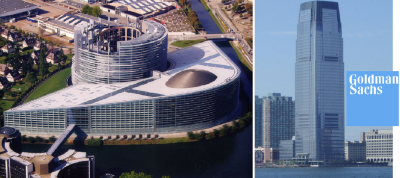
Calls to fully investigate what really happened in the Greek Economy, including from 1999-2001 or even earlier (i.e. 1980ies' period) multiplied in EU Parliament, in addition to similar moves at the National Greek Parliament (Vouli) and elsewhere.
The issue was reportedly raised, this week at the Conference of (Political Groups' Presidents) in view of next week's EU Parliament's plenary session in Strasbourg, where both the February 11 Brussels' EU Summit and EU's draft Economic Policy guidelines at the "2020" Horizon are due to be discussed and Resolutions voted.
Already, the experienced President of EU Parliament's Liberal Group, former Prime Minister of Belgium, Guy Verhofstadt, stressed since February 24 in Brussels, that it's "Urgent" to "take the Initiative" "to determine what exactly happened in Greece" :
- "It is important" to know, the President of the Liberal Group stressed, pointing to the fact that " Investment banks – Goldman Sachs, Morgan Stanley, Deutsche Bank – are minimising what they have done in the Greece case", as he said, speaking in Brussels shortly after revelations at New York of the Goldman Sachs' intervention scandal, which reportedly disguissed the real situation of Greece's Debt back in 2000, when the conditions and the Timing of its entry into EuroZone was decided.
- "We cannot talk about remedies, about solutions, about reforms in the EU if first of all we do not know what really happened in the case of Greece in 2008 and 2009 and before that", he pointed out, without Time-limits for the periods to examine.
That's why "it is the task of (EU) Parliament to organise Hearings with the relevant Committee, as quickly as possible, so that we can hear all the parties concerned on this matter. ...., I think it is absolutely necessary", Verhofstadt proposed.
Because, "we received contradictory information : Greece says that it has given all the information to the EU ... At the same time, the European Commission and Eurostat are saying that they did not receive all the necessary information", he observed, apparently speaking about the 2000 affair.
Similar calls were made earlier at EU Parliament's February Session in Strasbourg also by various other MEPs, as, f.ex. Austrian Hans Peter Martin, famous from his anti-Corruption endeavours, during a Debate on EuroZone.
EU Parliament's officials said now that special Hearings would be hold before the end of February on who is really responsible for provoking and/or hiding the true facts about Greece's huge debt. Witnesses from EU Commission, EuroStat, Greek Government, Goldman Sachs, Experts, etc. are due to speak at a forthcoming Hearing by the Economic Committee chaired by Brittish Liberal MEP Mrs Sharon Bowles.
Notoriously, a deal was brokered in 1999-2000, between former Socialist Governments in several EU Member Countries and the PASOK Government in Greece, according to which it accepted Turkey's controversial EU bid at December 1999 Helsinki Summit and the unfreezing of EU Funds for Turkey despite the non-fulfillment of Human Rights and International Law conditions by Ankara, in exchange of Athen's entry into EuroZone sooner than normal and even without the due preparatory reforms.
Many believe that, in case of Enquiry, EU Parliament couldn't credibly refuse full Investigations extended to recent Decades, including the way Greece's entry into EuroZone was prepared, after the recent revelations of the Goldman Sachs' scandal, dated since 2000-2001, when the American agency covered up the Socialist Greek Government's debt, while experienced EU Commission vice-President Almunia's (in charge of EU Financial affairs for 4 Years) latest data clearly indicated that Greece's Debt originated many years ago in the Past (See relevant Publication with Almunia's replies to "EuroFora"s questions : .. ).
Particularly when even USA's Federal Reserve's head Bernanke is reportedly investigating the 2001 Goldman Sachs' scandal, and Greece's main opposition party, Nouvelle Democratie, of former MEP Antonis Samaras, officially asked to extend an Investigation of the National Parliament, initiated by the governing PASOK Majority, "up to 1981", (i.e. from the start of "PASOK'" party's former governments)...
Meanwhile, experienced EU Commissioner in charge of Markets, Michel Barnier, anounced also a parallel EU Investigation on some Funds' alleged interference in Financial Markets on speculative operations aiming to buy Greek State's bonds at higher than normal intrest rates on March 2010 : A practice strongly denounced also by France, Germany and other EuroZone Member Countries, because it might threaten to progressively undermine parts of the Euro area by exploiting a few weak points earlier provoked.
***
Franco-Russian Summit Sarkozy-Medvedev to boost panEuropean area's development from 2010
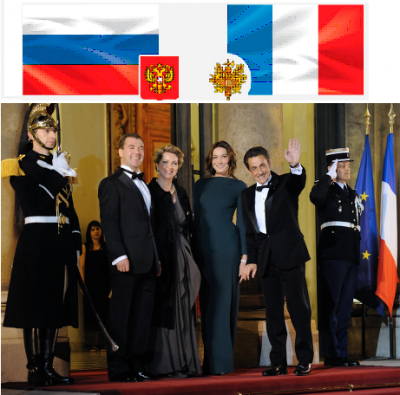
More agreements on Strategic and Hight-Tech issues of European interest between France and Russia, going even beyond those officialy anounced, are not excluded in the forthcoming period, well informed sources from the French Presidential Palace Elysee indicated to "EuroFora", while Presidents Sarkozy and Medvedev were meeting for a 3rd time this week in Paris for a long diner Tuesday evening.
In reply to "EuroFora"'s, questions on Space, High Speed Rail, and other High-Tech issues, Sarkozy's Spokesman, carefully, did not exclude that "other Agreements might have been signed, or are to be signed", between France and Russia, even if there might "not be any official information to communicate on that" now.
It's clear that they "spoke, in the most explicit terms, about a (PanEuropean) space for Economic Cooperation, Security and Circulation of Persons, (according to) the proposal (earlier) made by the President (Sarkozy), and on France's and EU's readines to engage a discussion on the (PanEuropean) Security debate", as well as about "many other particular issues", the Elysee Palace Official confirmed to "EuroFora".
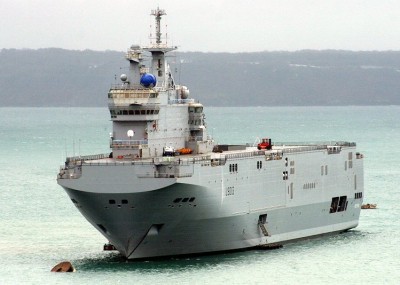
Meanwhile, France anounced deals about exporting High-Tech Helicopter carriers amphibius Boats "Mistral" to Russia, and Russia anounced that many Rockets "Soyouz" would be bought for the launch of EU's Satelite Navigation network "GALILEO" from the French Space Operation Center at Kuru (Guyane) later in 2010.
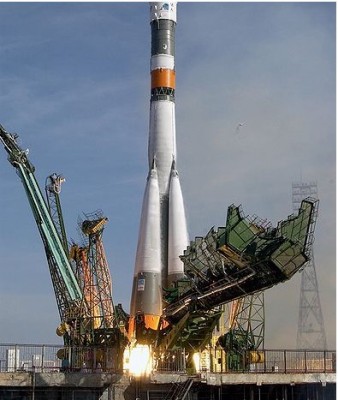
This was added to the official signature of another Franco-Russian deal on High-Speed Train Industries, less than a year before Hungary takes over EU's rotating Chairmanship (Jan. 2011), while the planned Paris-Strasbourg's High Spead Rail connexion to Budapest, through Stuttgart and Munchen (Germany), and Wienna (Austria), known as "Magistrale", could, in fact, acquire a Trans-Continental importance, by linking EU's advanced Train Network to Russia's "TranSiberian" rail road up to the Pacific Ocean...
All this was placed inside a comprehensive GeoPolitical Vision for EU - Russia's Strategic Partrenship by Presidents Sarkozy and Medvedev's own public statements, where PanEuropean Security issues figured high, in coherence with other moves on Culture, History, Economy, and Legal/Human Rights' issues.
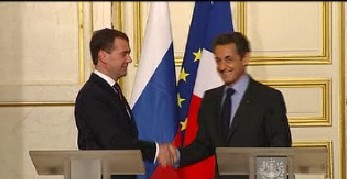
- "France considers Russia as a Strategic Partner" and "a Friend", while "I trust President Medvedev", who is "a great friend of France", stressed Sarkozy from the outset, reminding that "we had to solve together some hard Crisis, and we did it", as he said in a reference to his famous August 2008 trip to Moscow and Tbilisi to stop War between Russia and Georgia.
- "There is a very large Identity of views between, Russia and France on big issues", Sarkozy revealed, citting f.ex. Iran, Middle East, Nagorno Karabach and Ossetia, as well as G8 and G20 (that France will chair soon), Climate (where "we worked closely together with Russia at UNO's Copenhagen Summit", as he reminded), and European Security.
Confirming, "on Bilateral relations", that "France pleads for the suppression of Visas for Russia inside the EU", the "very promising" agreements between ALSTOM and its Russian counterpart in Rail-road Industry, as well as GDF-SUEZ's entry into GAZPROM's "North Stream" Gas Pipeline project, as well as "exclusive negotiations for 4 Mistral" boats to be delivered by France, Sarkozy stressed that "we want to advance towards a Common Space (Area) with Russia", and that "we must support Russia's efforts for Modernization".
- "We have Strategic Relations .. between Friends and Partners, because this reflects our vision for Europe and concerns the Interests of our Countries", which "have relations during many Centuries", while, "the problems that existed during the 20th Century, no longer exist : We don't have Ideological differences, no more". On the contrary, "we have a Common Goal : To create a Modern and Calm World, respecting Human Righs and Rule of Law",said from the start Russian President Dimitri Medvedev.
- "We must solve between us the European issues", Medvedev stressed, after expressing also Russia's "readiness to help (France) face Natural Hazards", as that of Atlantic Storm Xythia, which killed many people, inondated several villages, and deprived millions from Electricity, etc.
- UNO Summit, "last year, at Copenhagen, didn't work well, it was a fiasco", observed Medvedev. But "we are going to continue and unite our efforts to lift the problems on Climate which affect all the World".
- On the "G20, naturally, we are both concerned by a new Global Financial Architecture. Not only it isn't perfect, but we haven't almost made any progres. The Crisis weakened a bit, but it depends on us to design the framework of a New Financial Architectyre", because "the Bretton Woods Agreements, despite their importance, don't reflect the current situation no more". That's why "we agreed to advance in this ditrection and probably to take Initiatives", Medvedev anounced.
For that purpose, "New Frameworks need to be created. F.ex. for issues related to the dissolution of ex-Yugoslavia and of Caucasus, we are ready to speak together", he promised.
- "On Bilateral relations, France stands now ahead of USA on Investments" in Russia, Medvedev noted.
- But, "Security issues in Europe are of a Crucial Importance", stressed the Russian President , in reply to a Journalist's question.
- F.ex. "we discussed what happened on August 2008" : "These issues were solved without using Global procedures (i.e. UNO, etc). Not in the framework of NATO - Russia relations, but by using EU's potential and a personal initiative of the French President, who was courageous enough, despite the electrifiied ambiance" of that moment : He came, and he helped to solve that really thorny issue"
- "This proves that we must try to solve European issues among us", Medvedev underlined. "How could it be with the current procedures ?. They are not sufficient. Helsinki Act, concluded in 1975, is a good base for discussions, but this is not enough. there are New Issues in Europe. We must create New Frameworks in order to discuss Security issues".
- "We had a fairly long discussion on this question with President Sarkozy. We are juist at the beginning of the road. Russia's proposal is not a Dogma. We can work on this base. Simply we expect adequate Replies to Security issue". Ad; "f.ex. the problems provoked by the Dissolution of Yugoslavia, and the situation in the Caucasus. We are ready to work together with France and our Partners", Medvedev concluded.
- "I was among the first to examine the proposals made at Evian, one year ago, by President Medvedev, for a New Security Architecture. What can be done ?", wondered French President Sarkozy.
- "France returned to NATO's integrated command", during NATO's Heads of State and Government Summit, April 2009 in Strasbourg, and "is USA's ally, but .. Russia has nbothing to fear from NATO. We shall be faithfull to this Alliance", he confirmed.
- "But, don't we have to think what should be the security architecture of the EU and Russia ? Don't we have to face Common Challenges ? I think, fex. to Terrorism. Isn't it our interest to think how, in a period of Budgets in deficit, with all our Public Finance problems, we could work together, instead of working one against the other ?"
- "If we don't do that, then, what's the use to have ended the Cold War ? We are no more in the Cold War. I am convinced that Russia is not an adversary, but a Partner", Sarkozy stressed.
- "I know that there is a History of the continent. And I know that we have to help evolve the ideas at the EU side", where "some are less enthousiast than others", and "also at the Russian side, where some are more or less enthousiastic", he acknowledged.
- But, at the end, if we, as Presidents, don't push towards an Alliance, comprehension, mutual respect, then, what are we useful for ? There are many things on which we could work together, while respecting our respective alliances", Sarkozy declared.
- "We want to turn the page of the Cold War", stressed the French President, confirming the sentence initially pronounced by German Chancellor Angie Merkel on February (See "EuroFora"'s NewsReports from Paris, then).
- "In this issue of the (European) Continent's Security, we (France)'d like to associate also the German) Chancellor (Angie) Merkel, and are due to take Initiatives together", Sarkozy anounced.
- "I have seen many People write and speak about the discussions that we had, President Medvedev and me, during the August 2008 Crisis", he reminded. "But I didn't express my views in detail on this issue. I think that he (Medvedev) served well Russia's interests by asking for the Russian Army to stop. And I think that France defended well EU's Interests and Georgia's Independence, by doing what we have done. We did it without using our Armies, without threats, we did it by Diplomacy, by Dialogue. It wasn't easy, not at all, but we learned to know each other, and to advance forward. Because, in our continent, there is all that History behind, and the Time has come to turn the page", the French President concluded.
Sarkozy, who chaired then the EU while Brussel's bureaucracy was absent to sleepy Summer Holidays, reportedly phoned also to German Chancelor Merkel, and, after a dramatic appeal even by Christian catholic Pope Benedict to act to stop bloodshed, destructions , more sufferings and divisions to European People, between "Christian brothers", took the initiative to flow immediately to Moscow and Tbilisi, in the middle of the War, that he succeeded to stop.(Comp. "EuroFora"'s publication from Brixen/Bressanone, area of Pope Benedict andf Chancelor Merkel's Holiday sites, at the eve of President Sarkozy's Historic flight to Moscow and Tbilisi).
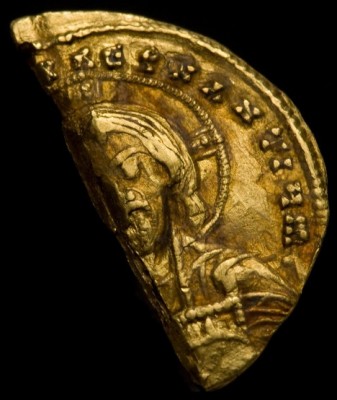
Next Day, "the profound Symbolism" reportedly found by French President Sarkozy in the "Holy Russia" Exhibition at the famous Louvre's Paris Museum, clearly highlighted the fact that Russia's History was closely linked to the rest of Europe for many Centuries, as President Medvedev stressed earlier. Initially via the Greek Culture and Christian Religion ( long before the chisme) of the former Byzantine Empire (which notoriously played a crucial role in the creation of a structured Russian area "in the way from the Scandinavians/Swedish to the Greeks", as it was called then the Kiev - Saint Petersbourg area linking the Baltic Sea to Constantinople, the Aegean and Mediterranean Seas).
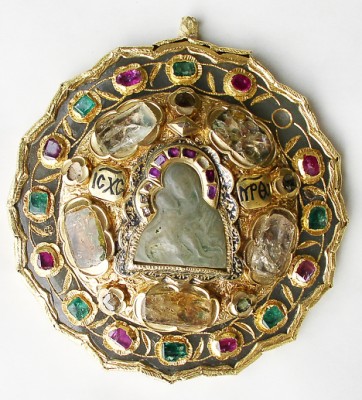
And afterwards via the French and other Western European (fex. Dutch, Austrian German, etc) Philosophical, Scientific and Artistic influences. Even before the 18th Century of the "Enlightnement" and Peter the Great's strategic decision to transfert the Russian Government from Moscow to Saint-Petersbourg's Baltic Seaport, full of Paris-like architectural monuments, (including a superbe project for Smolny Monastery prepared by an Italian-origin architect, named "Resurrection")..

Meanwhile, Dimitri Medvedev's visit, together with his wife Svetlana, to Paris' Historic Christian Catholic Church of "Notre Dame", where the Russian Presidential couple respectfully made the sign of the cross, symbolically leaving centuries of Europe's division between Orthodox and Catholics or Protestants behind them, as when all Christians were initially United in Europe, further outlined the Louvre's exhibition's main message.
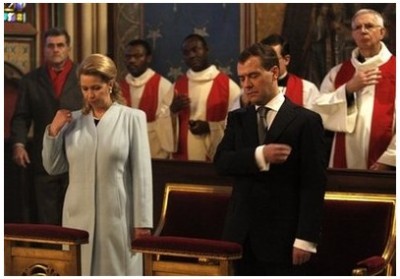
Stressing with an exceptional official Diner at Elysee Palace, next day, also his good Personal relations with the Russian President, Sarkozy reportedly expressed France's will to help Medvedev's declared aim for a "Modernization" of the country, with more developments on Human Rights' respect, Democracy and Rule of Law, as well as for closer cooperation in Science, Technology and Culture.
***
Van Rompoy succeeds to make a British EuroSceptic use a Pro-European Vocabulary...
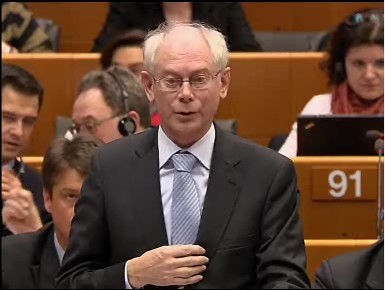
(+Opinion). A 1st succes by EU Council's first President, the serious, profound and concise Herman Van Rompoy, wasn't only his obvious Pedagogical capacities, in the crystal-clear and substantial presentation he made to MEPs after the Solvay Library's EU Summit of February 11 in Brussels, both of the New EU Institutions, created by Lisbon Treaty's entry into force since December 2009, and of EU Heads of State/Government discussions how to draft EU's New Economic Strategy up to 2020, in addition to immediate concerns over the financial Crisis in Greece and elsewhere.
Van Rompoy made it clear that his "full time" role, after being elected by the 27 EU Countries' Governments for the next 2,5 Years, is mainly focused on EU's "overall Strategy", organizing and following up "Collective Decisions" of the "European Council" (i.e. the highest Summits of EU Heads of State/Government, able to reach official decisions each 6 Months, in addition to Informal Summits for political discussions), while also representing it both in Internal and External High-level meetings, (in the latter case by "working closely together" with EU Commission's vice-President on External Affairs, Barones Ashton, Head of EU's new Foreign policy service).
But it was more the frustration provoked to various MEPs by his careful abstention from early public appearances and frequent noisy statements on various current affairs, (as they were accustomed), which apparently created opposing, but strong feelings in some at EU Parliament.
From the one side, new leader of the French Governing Majority Party's MEPs, (UMP), Jean-Pierre Audy, who had vainly called for Van Rompuy to start debates at EU Parliament since December 2009 (see Audy's statements to "EuroFora", published then), friendly regretted that EU's 1st President didn't come first to speak to EU Citizens :
- "We can't do Politics without Democracy, and the Democratic Lecons of the 2005 French and Dutch Euro-Referenda, as well as in many other Countries, if People were consulted, is that EU Citizens are not against Europe, but feel that it's working without them, sometimes against them". That's why German Chancelor Merkel and French President Sarkozy tried to put EU Citizens back at the heart of the European construction : Nothing will be done without EU Citizens, nor without Member States' Governments, he said.
- "You have a duty to give a Meaning, to fix an Aim, to convince that Europe brings Solutions, protects, acts", Audy advised. - "EU walks on its 2 feet : Governments of States, and People. You should play the role of its Head, and it's from your capacity to attract States towards a Political Union that depends EU's Future", he concluded.
From the other side, British EuroSceptic MEP Nigel Farage, Chairman of the EFD Group, notoriously over-reacted, on the contrary, by a personal aggression against Van Rompoy, insulting his look as if it reminded a "damp rag" or a "low-grade Bank Clerk", and calling his Country, Belgium, "a Non-Country", (etc)... provoking protests from other MEPs.
Many Media pubished Farage's incident versus Van Rompoy, but nobody noticed yet what is perhaps the most important :
- For the 1st time in his career, Farage, whose party wants for the UK to withdtraw from the EU, instead of restricting himself only in his usual anti-EU criticism, on the contrary, now, speaking of Van Rompoy, he was incited to use an astonishingly .. pro-European Vocabulary :
- F.ex., he spoke about "the Peoples of Europe", praised "European Democracy", and practically supported that a "President of Europe" should be "Voted" by EU Citizens, and be someone "heard" allover Europe, as "a Giant Global Political Figure", a "Political Leader for 500 Million People", strengthened by a "Vote" giving him "Legitimacy", in order to "speak on behalf of the Majority of (EU) People", (etc).
I.e. by accusing Van Rompoy, in his view, not to fulfill yet the Promises made to -and not to meet yet the Expectations of- the People of Europe, Farage was surprisingly obliged to refer to even stronger pro-European Political integration aims than those contained in EU Lisbon Treaty, (which, f.ex. , does not provide yet for a direct election of an "EU President" by EU Citizens). And, indirectly but inevitably, (contrary to his own beliefs), attributed a great importance to such extremely advanced pro-European expectations...
Farage" even ..praised Van Rompoy for being "Competent and Capable", and therefore .."dangerous" for "Nation States"", as he said, returning back to a traditional EuroSceptic point of view.
But, meawhile, Van Rompoy's unexpected "miracle" had worked : His serious, reserved and careful personality, had obviously frustrated even an openly declared anti-E.U. as British "Independentist" MEP Mr. Farage, to the point to make him, unwillingly, adopt a pro-European Vocabulary valorizing EU Political Integration...
Smart move, President Van Rompoy !
***
- ECHR President Costa +CoE Chair Swiss Justice Minister to EuroFora: Interlaken + Human Rights Future
- CoE Human Rights Director Boillat to EuroFora on NGOs concerns and Interlaken Ministerial Conference
- 1st Global Space Community's debate on Obama's NASA 2011 Budget Cuts+Changes at ISU's 2010 Symposium
- Russian Space Research Institute Head Zelenyi to EuroFora: Projects before Medvedev-Sarkozy Summit
Main Menu
Home Press Deontology/Ethics 2009 Innovation Year EU endorses EuroFora's idea Multi-Lingual FORUM Subscribers/Donors FAQs Advanced search EuroFora supports Seabird newsitems In Brief European Headquarters' MAPs CoE Journalists Protection PlatformBRIEF NEWS
- 00:00 - 02.06.2021
- 00:00 - 18.10.2020
- 00:00 - 19.06.2020
- 00:00 - 18.05.2020
- 00:00 - 20.04.2020
- 00:00 - 02.02.2020
- 00:00 - 09.12.2019
- 00:00 - 27.11.2019
- 00:00 - 16.11.2019
Popular
- Yes, we could have prevented Ferguson riots says World Democracy Forum's Young American NGO to ERFRA
- Spanish People Elect CenterRIGHT Majority with 1st Party and Total of 178 MPs (6 More than the Left)
- Pflimlin's vision
- The European Athletic "Dream Team", after Barcelona 2010 Sport Championship Results
- Source Conseil d'Europe à ERFRA: Debatre Liberté d'Opposants à Loi livrant Mariage+Enfants à Homos ?
- Head of BioEthics InterGroup, MEP Peter Liese : "Embryonic stem cell research reaching its END" !?
- Spain: Jailed Turkish Terror suspect with Explosive,Drones,Chechen accomplices stirs Merah+ Burgas ?
- UN Head Ban Ki Moon at CoE World Democracy Forum : - "Listen to the People !"
Latest News
- Test Photos (f.ex.+ Invit to EU + Korea Peace meeting)
- EUOmbudsmen Conference 2022: Digital Gaps affect People's Trust threaten EF Project on EU Future ?
- French Election : Black Out on Virus, but Obligation for Fake 'Vaccines" Challenged
- Both French Presidential Candidates point at "Humanism" in crucial times...
- France : Zemmour = Outsider may become Game Changer in Presidential + Parliamentary Elections 2022
Statistics
Visitors: 61743080Archive
Login Form
Other Menu
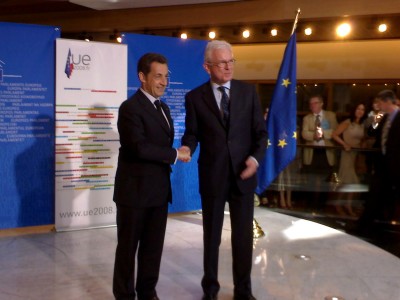
In a last-minute, surprise move, New EU Chairman, French President Nicolas Sarkozy, anounced a proposal in Strasbourg to open an EU Parliament debate on Europe's Identity in the ranup to 2009 Election :
- "I am conscious of the fact that there is, today, a real Crisis on Europe's
Identity", he replied earlier to a question by Greek MEP Ioanis Varvitsiotes, who had asked him to "advance beyond those who don't really want a Political Europe",
- "Why not a real Debate on what is Europe's Identity ?", proposed
Sarkozy, in this regard.
- "EU Parliament could organize such Debates", he suggested :"It's
better for EU Parliament, than for National Governments, or EU Commission, to
define what is the European Identity", the French President proposed.
A diplomatic way to avoid obstacles by some Governments and/or some Brussels' bureacrats, reportedly opposed to really free and popular, critical European debates on hot political issues..
Sarkozy brillantly won the 2007 Presidential and Parliamentary Elections in France in 2007, in the line of the principles anounced at an important Speech in Strasbourg, February 2007, about a Political Europe, and a European Identity on issues which matter to the People.













